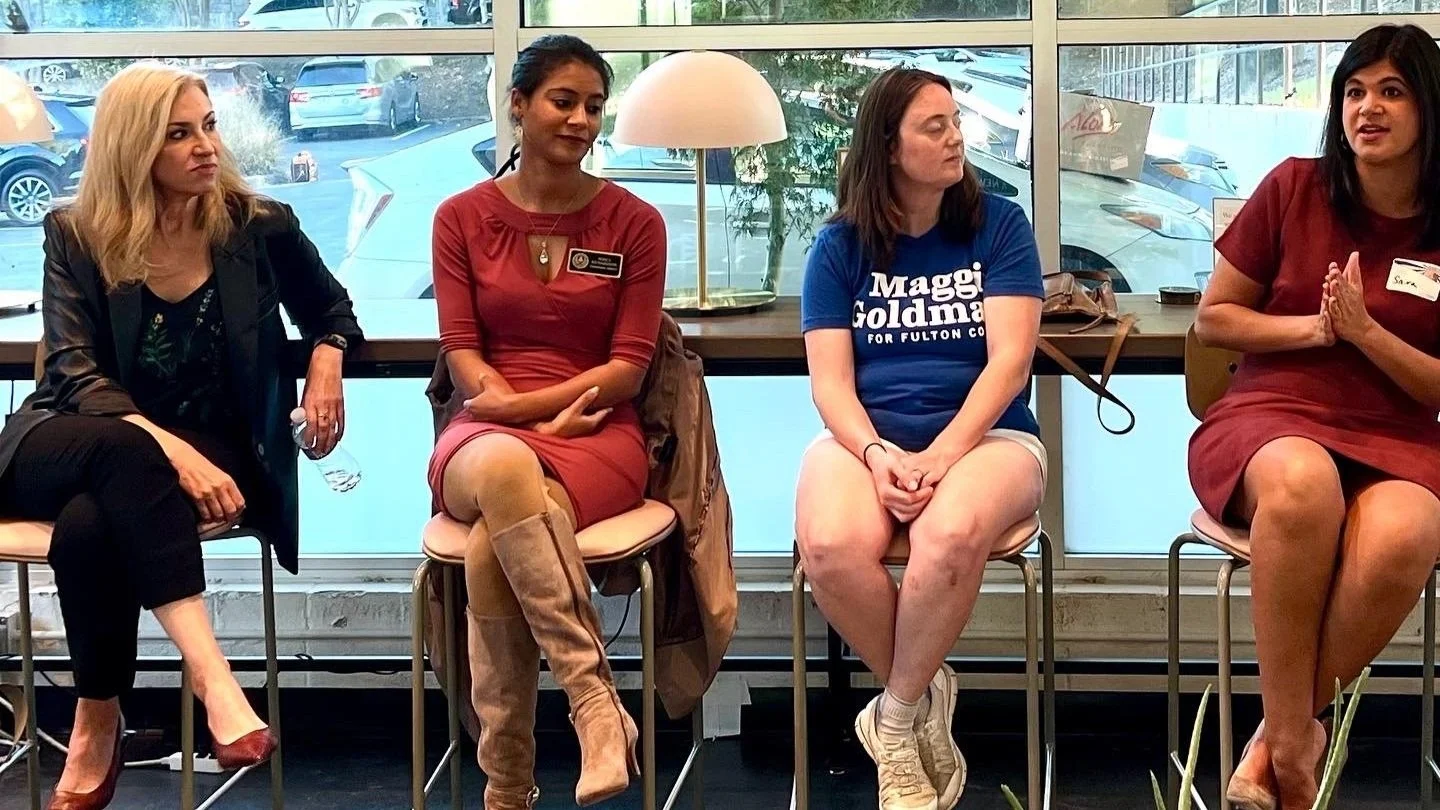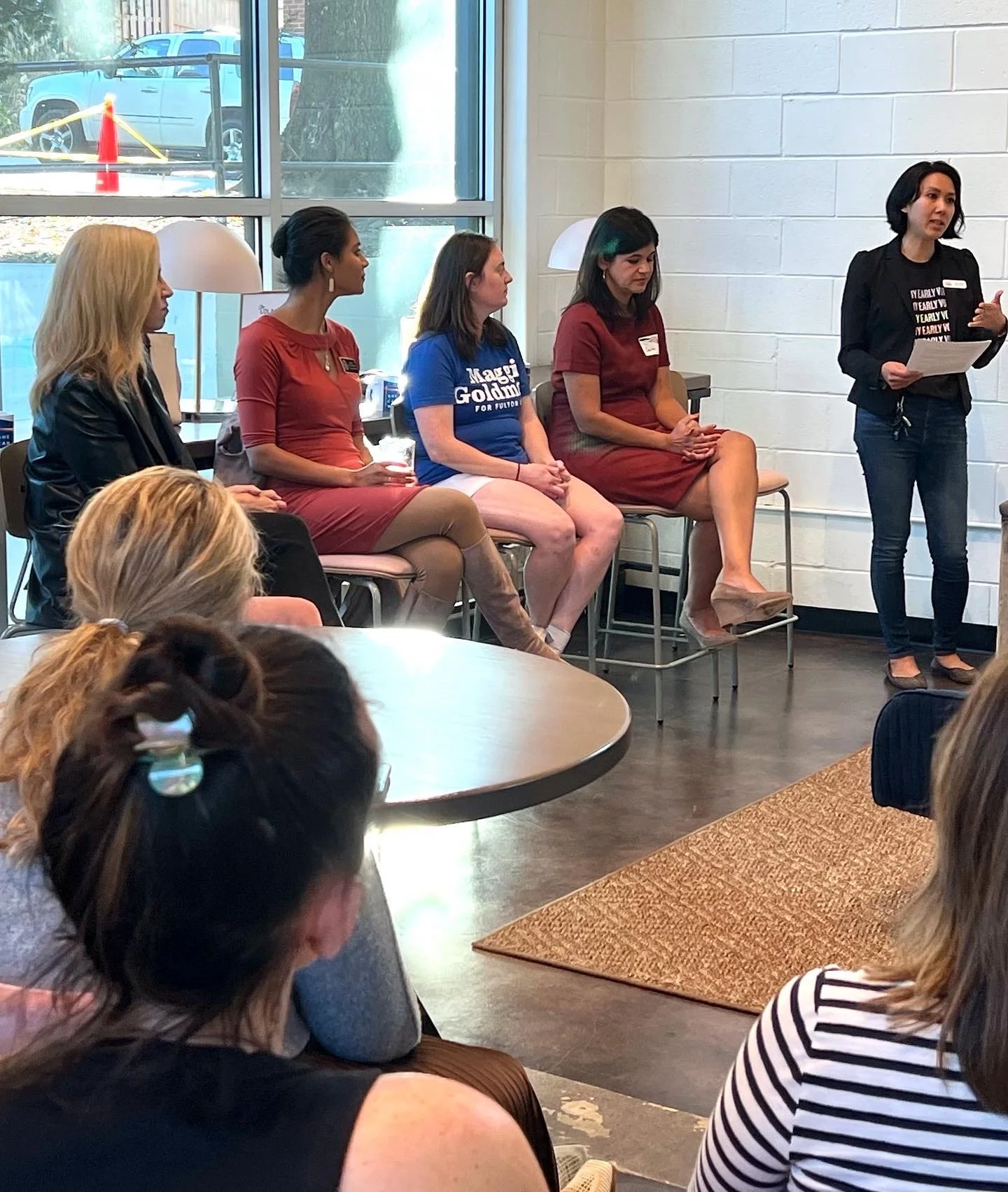By Rebecca Aqua and Sarah Baldauf
What do women do when Georgians’ rights and the democratic process are on the line? They learn the landscape, they strategize, and they take action. What can you do to push back in an era in which voting – and fair, free elections – has become more fraught and less accessible since passage of SB 202, Georgia’s new voting law? More than you might think… and it doesn’t end once Election Day passes. Her Term recently hosted a Protect the Vote panel with experts who’ve already been contending with the new law to help us better understand what we’re up against and what actions we can take.
Pictured from left: Dana Barrett, Commissioner Jerica Richardson, Maggie Goldman, and Saira Draper. Please donate to these women and support the important work they are doing.
Han Pham, Executive Director of Her Term, led the discussion with Saira Draper, candidate for GA State House (District 90), civil rights attorney and former head of voter protection for the Democratic Party of Georgia; candidates for Fulton County Commission: Dana Barrett (District 3), small business owner and 2020 Democratic nominee for US Congress (GA-11), and Maggie Goldman (District 1), realtor and small business owner; and sitting Cobb County Commissioner for District 2, Jerica Richardson, who’s already been contending with Georgia's new voting law in her role as a commissioner.
The Protect the Vote panel provided a powerful short course on elections in a post-SB 202 Georgia, including: why down ballot voting is critical; the essential role of county commissioners in our elections; and how SB 202 puts state takeover of local elections on the table. Perhaps most importantly, the panel offered us all marching orders on how we can participate in protecting not only our vote, but also our democracy. Find key takeaways and action steps below.
Voting Down the Ballot is Key
Don’t stop after voting for top offices like Governor and US Congressional seats. If we fail to vote in a deep bench of ethical leaders across local, county, state and federal legislatures, our power will remain limited against passage of new laws that chip away at our rights and the democratic process.
Guests speak with the panelists at The Lola
County Commissioners vs. State Takeover of Our Local Elections
County commissioners are more vital to our democracy than ever before. . In addition to managing essential county services like the fire and police departments, county commissioners administer elections and are responsible for budgeting, staffing, preparing for and running local and statewide elections. In the wake of SB 202’s passage, county commissioners are in an ever more consequential position. The new law creates pathways for state takeover of local, county and statewide elections, which have historically been administered and certified by county boards of election and county commissioners.
SB 202 Thus Far: Reduced Access & Resources; New Risk of State Interference
Instead of strengthening a process that upholds the will of the people, SB 202 is already threatening election integrity. While we’re still in the midst of the first election since the law went into effect, our panelists shared a number of ways it’s already restricting voter education, voting access, reducing resources for carrying out the elections process, and opening the floodgates to challenges (including to voter eligibility and potential election results). Thus far, SB 202 has driven inefficiency, helping make the case for triggering a new measure in the law: state takeover of local elections. This could put appointed officials in power to certify our local elections as they see fit. As the panelists shared, the devil is in the details:
Counties currently must spend more to satisfy the rules and regulations of the new law, while at the same time, they’re no longer able to accept funds from outside non-profit groups. This leaves our elections process under-funded and voters under-educated about Georgia’s new voting rules, as well as basic information about registration, eligibility, dates, etc. Understaffed elections offices have had to process a rash of voter eligibility challenges enabled by SB 202, which allows anyone - even those from other states – to challenge individuals’ right to vote. While this has yielded no fruit in terms of protection against ‘voter fraud,’ it has been extremely burdensome to the people tasked with carrying out our elections.
While SB 202 requires at least one ballot box per county, the number of ballot boxes per county has decreased. For example, Fulton County had 38 in 2020 and now has only seven.
The vote by mail process was compressed, including a shorter window of time to request a ballot and to vote by mail , along with reduced staffing to support this aspect of voting. As a result, Georgians’ ability to vote by mail was significantly diminished.
Our Marching Orders:
Vote all the way down the ballot. Educate your personal networks on why this is essential in protecting the elections process in Georgia.
Know, share, and use the Voter Protection Hotline: (1-888-730-5816). It’s a tool in our elections process, and as recent history has shown us, we’ll need to use it.
Make your voice heard beyond the ballot box. Election proceedings, including challenges and potential escalation to a state takeover (made possible by SB 202), will be made public at hearings and meetings. It is essential that we participate in the process – with our presence, our testimony, and by informing our networks about what is at stake. Schedules and opportunities to testify will be on your county’s website.



